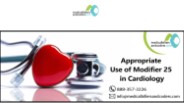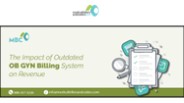Medicalbilling Medicalcoding PowerPoint PPT Presentations
All Time
Recommended
Learn the importance of old AR recovery in healthcare billing.: https://shorturl.at/ruQ89 Discover how addressing unpaid claims can lead to better financial health for hospitals and medical groups. #OBGYNBilling #MedicalBilling #ARManagement #RevenueCycleManagement #MedicalCoding
| PowerPoint PPT presentation | free to download
Efficient Reimbursement: Say Goodbye to Claim Denials! Struggling with claim denials? Efficient reimbursement starts with accurate billing, thorough documentation, and proactive denial management. Streamline your payment process and ensure seamless cash flow for your practice. Need expert support? Contact Medical Billers and Coders at info@medicalbillersandcoders.com to simplify your billing and boost efficiency! Read More: https://shorturl.at/YFzed #ClaimDenials #MedicalBillingandCoding #RevenueCycleManagement #MedicalBilling #MedicalCoding #MBC #MedicalBillersAndCoders #HealthcareBilling
| PowerPoint PPT presentation | free to download
Clear the Confusion about New Patient CPT Code Range Understand the importance of accurate coding and reimbursement with new patient CPT codes. Learn about the new patient CPT code range and its significance for primary care physicians.: https://shorturl.at/gJKQ1 #MedicalBilling #MedicalCoding #CPT #CPTCode #NewPatientCPTCodes #HealthcareProfessionals #MedicalBilling #NewPatientCodes #HealthcareGuidelines #MedicalPracticeManagement #MedicalBillersandCoders #MBC #RCM
| PowerPoint PPT presentation | free to download
Appropriate Use of Modifier 25 in Cardiology Learn about the importance of Modifier 25 in cardiology: https://bit.ly/3vM42VB. Understand when a significant E/M service is necessary for accurate billing. Medical billers and coders ensure this modifier is correctly applied, helping to avoid billing errors and ensuring accurate reimbursement for cardiology services. #Modifier25 #CardiologyBilling #MedicalCoding #EvaluationsandManagement #HealthcareBilling #CardiologyServices #MedicalBilling #CardiologyModifiers #BillingGuidelines #HealthcareCompliance
| PowerPoint PPT presentation | free to download
Dermatology billing faces challenges like incorrect coding, denied claims, and changing insurance policies. Ensure staff are trained in dermatology-specific codes and use robust systems for checking claims before submission. Stay informed about insurance updates and communicate clearly with patients about their financial responsibilities. Medical Billers and Coders (MBC) can help by ensuring accurate coding, timely claim submission, and effective follow-up on denied claims, allowing you to focus on patient care. Read more about How to Overcome Challenges in Dermatology: https://shorturl.at/D7ANX #DermatologyBilling #MedicalBilling #RevenueCycleManagement #HealthcareBilling #BillingChallenges #MedicalCoders #MedicalBillersAndCoders
| PowerPoint PPT presentation | free to download
HI vs AI in RCM: Striking the Balance for Optimal Results When it comes to Revenue Cycle Management (RCM), balancing human intelligence (HI) with artificial intelligence (AI) is key for achieving optimal outcomes. While HI brings human expertise and intuition, AI offers efficiency and automation. By striking the right balance between the two, RCM processes can be streamlined effectively, leading to improved results. Find the perfect blend of HI and AI for your RCM needs to maximize success. Read More Information: https://shorturl.at/gtR02 Connect with our expert medical billing team today at 888-357-3226 #RCM #RevenueCycleManagement #HIvsAI #AIinRCM #RCMProcesses #MedicalBilling #MedicalCoding #MedicalBillersandCoders #MBC #MedicalBillingServices #MedicalCodingServices #MedicalBillingandCoding #HIvsAIinRCM
| PowerPoint PPT presentation | free to download
The Impact of Outdated OB-GYN Billing System on Revenue Using an outdated OB-GYN billing system can significantly hurt your practice's revenue. Inefficient billing processes lead to errors, delayed payments, and increased claim denials. These issues can strain your financial health and distract you from providing quality care to your patients. Switching to a modern, efficient billing system is crucial. Medical Billers and Coders, a leading medical billing company, can help. They offer specialized services to streamline your OB-GYN billing, reduce errors, and ensure timely reimbursements. Their expertise allows you to focus on patient care while improving your practice's financial performance. Learn more about how Medical Billers and Coders can optimize your billing system and boost your revenue.: https://shorturl.at/UpF0Q #OBGYNBilling #MedicalBilling #RevenueCycleManagement #HealthcareBilling #MedicalCoders #PracticeRevenue #BillingEfficiency #MedicalBillersAndCoders
| PowerPoint PPT presentation | free to download
Learn about the best options on completing your #Medicalbilling and coding training from codingclarified.com and Become medical billing and coding specialist.
| PowerPoint PPT presentation | free to download
While practices struggle towards well-organized and qualitative medical billing and coding to improve claims first-pass rate and monthly collections; on the other hand claim denials, rejections and low payments are unavoidable.
| PowerPoint PPT presentation | free to download
Accounts receivable (AR) days refers to the average number of days it takes a practice to collect payments due. The lower the number, the faster the practice is obtaining payment, on average. For financial stability for any practice and overall expansion opportunities, it’s always preferential to have minimum number of AR days.
| PowerPoint PPT presentation | free to download
End-Stage Renal Disease (ESRD) is a medical condition in which a person’s kidneys cease functioning on a permanent basis leading to the need for a regular course of long-term dialysis or a kidney transplant to maintain life. Beneficiaries may become entitled to Medicare based on ESRD. Benefits on the basis of ESRD are for all covered services, not only those related to the kidney failure condition.
| PowerPoint PPT presentation | free to download
The Centers for Medicare and Medicaid Services (CMS) has announced a shift in its eligibility criteria for coverage of lung cancer screening using low-dose CT (LDCT), with implementation date of October 3rd, 2022. In addition, CMS also made other modifications to its eligibility criteria that will increase the ability of more people to obtain access to screening, effective February 10, 2022.
| PowerPoint PPT presentation | free to download
Payment posting is an integral part of the revenue cycle management (RCM) of any healthcare organization. As the name suggests, payment posting involves posting the payments and their reconciliation. The billing team will post the received and denied payments into billing software against the submitted claim.
| PowerPoint PPT presentation | free to download
Billing for Ambulatory Surgery Centers (ASCs) is tightly regulated by numerous federal as well as state-level regulatory authorities. Complete documentation will support all procedure codes your billed and will provide complete picture for payers. In this article, we shared list of required documents for ambulatory surgery centers who are beneficiaries of Medicare.
| PowerPoint PPT presentation | free to download
It has been widely observed that nowadays pharmacists have an expanded scope of practice by incorporating more clinical aspects into routine patient care like chronic disease management, care transitions interventions, and medication therapy management.For these clinical services to be sustainable, pharmacists must be able to receive payment for the resources and time dedicated to improving patient care and outcomes.
| PowerPoint PPT presentation | free to download
Providers always want to provide the right care to the patient as quickly as possible, while the health plans want to ensure treatment choices are appropriate, legitimate, and cost-conscious. The definition of appropriate and legitimate treatment has been updated constantly by insurance carriers creating a lot of issues for providers.
| PowerPoint PPT presentation | free to download
During the COVID-19 Public Health Emergency (PHE), reimbursements for telehealth continue to evolve. The federal government, state Medicaid programs, and private insurers have expanded coverage for virtual health care services. During the COVID-19 public health emergency, any health care provider who is eligible to bill Medicare can bill for telehealth services regardless of where the patient or provider is located.
| PowerPoint PPT presentation | free to download
Starting on January 1, 2022, the No Surprises Act (NSA) protects uninsured or self-pay individuals from many unexpectedly high medical bills. The Good Faith Estimate shows the costs of items and services that are reasonably expected for patients’ health care needs for an item or service. The estimate is based on information known at the time the estimate was created. The Good Faith Estimate does not include any unknown or unexpected costs that may arise during treatment.
| PowerPoint PPT presentation | free to download
People seek long-term care when they have a serious, ongoing health condition or disability, and the need for long-term care can arise immediately after a heart attack or stroke. In addition, the need for LTC is rising due to people get older, and illness or disability gets worse.
| PowerPoint PPT presentation | free to download
Medicare Secondary Payer (MSP) is the term generally used when the Medicare program does not have primary payment responsibility i.e., when another entity has the responsibility for paying before Medicare. The MSP provisions have protected Medicare Trust Funds by ensuring that Medicare does not pay for items and services that certain health insurance or coverage is primarily responsible for paying. The MSP provisions apply to situations when Medicare is not the beneficiary’s primary health insurance coverage.
| PowerPoint PPT presentation | free to download
Under Fee-for-service (FFS) Medicare, home infusion therapy (HIT) involves the intravenous or subcutaneous administration of drugs or biologicals to an individual at home. The components needed to perform home infusion include the drug (for example, antivirals, immune globulin), equipment (for example, a pump), and supplies (for example, tubing and catheters).
| PowerPoint PPT presentation | free to download
Medicare pays a physician for an Annual Wellness Visit (AWV) service. This visit is planned to develop or update a Personalized Prevention Plan (PPP) and perform a Health Risk Assessment (HRA) which is covered once every 12 months by Medicare. Medicare covers an AWV for all patients who aren’t within 12 months after the eligibility date for their first Medicare Part B benefit period and who didn’t have an IPPE or an AWV within the past 12 months.
| PowerPoint PPT presentation | free to download
The requirements for most evaluation and management codes have become more accurate over the past few years. However, one prominent exception to this is CPT’s level-I established patient encounter CPT Code 99211 for an office visit. CPT defines this code as an “office or other outpatient visit for the evaluation and management of an established patient that may not require the presence of a physician.”
| PowerPoint PPT presentation | free to download
Billing and coding guidelines for various medical specialities are constantly getting updated due different COVID-19 variants. Before delivering services, providers are really not sure about insurance coverage for that specific procedure. As Public Health Emergency (PHE) has extended beyond 16th April 2022 by 90 days, various waivers are continued, making no change in billing guidelines in pandemic
| PowerPoint PPT presentation | free to download
Telehealth is witnessed high and low acceptance during COVID-19 pandemic last year, and it might play a key role in care delivery in 2022. During pandemic, guidelines has been loosened for more acceptance of telehealth services as in-person care may not be available all the time.
| PowerPoint PPT presentation | free to download
Its quite common to receive a request for medical records from insurance carrier who is going to conduct an audit on your claims. Sometimes, in such external/payer audits, practices receive audit results like, medical necessity not supported; records include conflicting data; or notes are cloned.
| PowerPoint PPT presentation | free to download
‘Incident-to’ services are usually initiated by a physician and provided by a non-physician provider (NPP) following the care plan and supervision of the physician. The physician must be physically present in the office suite and the services provided must be commonly performed in the physician’s office.
| PowerPoint PPT presentation | free to download
What’s a Medicare Administrative Contractor (MAC)? Its quite common for any provider to get confused while billing to Medicare for healthcare services, as they not billing to Medicare but to a MAC. In this article, we discussed about what is MAC and activities handled by all these contractors.
| PowerPoint PPT presentation | free to download
It’s quite normal to receive a request for medical records from a payer who is going to conduct an audit on your claims. You will prepare for this payer coding audit confidently, as you have excellent electronic health record (EHR) system; the notes are voluminous; and your coders are well-versed at coding.
| PowerPoint PPT presentation | free to download
Telemedicine is rapidly redefining healthcare and evolving to provide increased access to high-quality healthcare especially during the current COVID-19 pandemic, but you need to know what exactly telemedicine service? it is a service that enhances the patient health and experience by permitting two-way, real-time interactive communication between the patient and the physician at a distant site.
| PowerPoint PPT presentation | free to download
As defined by the Healthcare Financial Management Association, revenue cycle refers to “all administrative and clinical functions that contribute to the capture, management, and collection of patient service revenue.” It means, it take account of the complete patient’s account lifecycle, from initial appointment setup to insurance collection.
| PowerPoint PPT presentation | free to download
Medical billing is a tough task. It requires specialty-wise billing & coding expertise and also consumes a lot of time. Even though you have a team of expert billers and coders, it doesn’t ensure you are getting accurate reimbursements from insurance carriers and patients. Tracking key performance indicators will help you to understand what mistakes you are making and areas for improvement. In this article, we discussed 7 such important key performance indicators which will help to track the financial performance of your practice.
| PowerPoint PPT presentation | free to download
The Physician Certification Statement (PCS) is the written order certifying the medical necessity of non-emergency ambulance transports. The regulations governing PCS requirements are specified in the Code of Federal Regulations at 42 CFR 410.40(d).
| PowerPoint PPT presentation | free to download
Medicare’s 3-day (or 1-day) payment window applies to outpatient services that hospitals and hospital wholly owned or wholly operated Part B entities furnish to Medicare beneficiaries. The statute requires that hospitals bundle the technical component of all outpatient diagnostic services and related non-diagnostic services.
| PowerPoint PPT presentation | free to download
You may find that there is confusion between family physician and Internal medicine physicians. The confusion arises because of the treatment of adult patients. Most of adult patient treatments are carried out by family physicians while Internal medicine physicians only treat adults. However, there are some notable differences between internal medicine and other specialties.
| PowerPoint PPT presentation | free to download
The Centers for Medicare & Medicaid Services (CMS) recognizes that CCM services are critical components of primary care that promote better health and reduce overall health care costs. In 2015, Medicare began paying separately under the Medicare Physician Fee Schedule (PFS) for CCM services furnished to Medicare patients with multiple chronic conditions.
| PowerPoint PPT presentation | free to download
Effective for claims with dates of service on and after January 1, 2020, the CQ and CO modifiers are required to be used, when applicable, for services furnished in whole or in part by a physical therapist assistant (PTAs) or occupational therapy assistants (OTAs), on the claim line of the service, along with the respective GP or GO therapy modifier, to identify those services furnished in whole or in part by a PTA or OTA under a physical therapy or occupational therapy plan of care.
| PowerPoint PPT presentation | free to download
Workforce management is key for every healthcare organization for better financial outcomes hence it is important for you to focus on your workforce management. It is the continuous process to optimize productivity with effective management of employees and personnel.
| PowerPoint PPT presentation | free to download
Patient eligibility and benefits verification is the process by which medical practices confirm insurance coverage for planned care. This insurance coverage report will include information such as coverage, co-payments, deductibles, and coinsurance with a patient’s insurance company.
| PowerPoint PPT presentation | free to download
Medical Billing specially is an essential function of healthcare organizations because the continuous and smooth flow of revenue management of the hospitals and clinics is dependent on this. Any error or inaccuracy at billing results in inefficiency in further process.
| PowerPoint PPT presentation | free to download
The COVID-19 pandemic has significantly disrupted every industry in the world and healthcare is no exception to that. Primary care practices are significantly disrupted as office visits and revenues seen large declined as primary care physicians and patients alike fear in-person visits may increase their risks of contracting the virus.
| PowerPoint PPT presentation | free to download
When a patient’s insurance claim is denied, not only can your cash flow be affected, the relationship with your patient can be damaged as well. Some claim denials can be successfully appealed, but even when appeals succeed, they can temporarily leave claim status up in the air – something both your practice and your patient would like to avoid.
| PowerPoint PPT presentation | free to download
Choosing a medical billing company for the billing and coding process helps healthcare providers to concentrate on medical treatment. A medical billing company like Medisys Data Solutions handles a large chunk of healthcare billing tasks. So that providers are released from the grunt work involving a variety of patient information.
| PowerPoint PPT presentation | free to download
Improving your practice collection is just one component of effective revenue cycle management. But if any provider overlook this key step then they risk losing their owed and losing out on much needed revenue. Despite resuming in-person visits and elective surgeries, many practices still struggle with reduced patient volume and the resulting decrease in practice revenue.
| PowerPoint PPT presentation | free to download
New patient is defined as, an individual who has not received any professional services, Evaluation and Management (E/M) service or other face-to-face service (e.g., surgical procedure) from the same physician or physician group practice (same physician specialty and subspecialty) within the previous 3 years.
| PowerPoint PPT presentation | free to download
Small and independent practices face unique challenges today, starting from move away from fee-for-service payment models to handling billing and coding activities all by themselves. The challenges of denial management have multiplied. ICD-10 and value-based reimbursement will have huge impacts on claims processing.
| PowerPoint PPT presentation | free to download
The Health Insurance Portability and Accountability Act (HIPAA) was introduced in year 1996. As the name suggests, it was created to ensure that all ‘protected health information’ was appropriately secured and restricted access to be given only to authorized individuals. Another goal was to prevent healthcare fraud.
| PowerPoint PPT presentation | free to download
The Advance Beneficiary Notice of Noncoverage (ABN) i.e., form CMS-R-131, is issued by providers (including independent laboratories, home health agencies, and hospices), physicians, practitioners, and suppliers to Original Medicare (fee for service – FFS) beneficiaries in situations where Medicare payment is expected to be denied. The ABN is issued in order to transfer potential financial liability to the Medicare beneficiary in certain instances.
| PowerPoint PPT presentation | free to download
Submitting clean claims will ensure timely and accurate insurance reimbursements. Clean claims will ensure that you are not wasting your staffs’ time on reworking insurance claims. As per definition, a clean claim is a submitted claim without any errors or other issues, including incomplete documentation.
| PowerPoint PPT presentation | free to download
Telehealth has proved to be an effective option to fight the outbreak of COVID-19. Telehealth services played a major role in preventing, diagnosing, treating, and controlling diseases during the COVID-19 outbreak. Even though an extended COVID-19 public health emergency (PHE) is scheduled for April 16, 2022, policymakers are thinking about extending telehealth flexibilities on a permanent basis.
| PowerPoint PPT presentation | free to download
Denial Management is a key process of revenue cycle management. It is the process where every unpaid claim is investigated. It helps practices quickly and easily determine the causes of denials, know the future risks, and get paid faster. When practice deals with government and various private insurance carriers and that too for various billing scenarios, each denial is different.
| PowerPoint PPT presentation | free to download
Consider a scenario, where your amazing employee incorrectly posts the payment of $1002 rather than $102, the claim made its way along medical billing process, the mistake wasn’t caught. First of all, the patient received an excessive bill, which doesn’t inspire confidence in practice. The practices account receivables reports are now inaccurate and the overall financial picture is askew, from one incorrectly entered number.
| PowerPoint PPT presentation | free to download
An Alternative Payment Model (APM) is a payment approach that gives added incentive payments to provide high-quality and cost-efficient care. In October 2021, the Center for Medicare and Medicaid Innovation (CMMI) announced a goal of having every Medicare beneficiary and the majority of Medicaid beneficiaries covered by some type of alternative payment model (APM) by 2030.
| PowerPoint PPT presentation | free to download
Running a financially stable medical practice is a challenging task. With the added challenges from the COVID-19 pandemic and changes in billing guidelines and reimbursement policies, things are getting tougher over time. Medisys Data Solutions is a leading medical billing company providing complete revenue cycle solutions for practices of various medical specialties.
| PowerPoint PPT presentation | free to download
Claims denial can be challenging to manage for any healthcare provider who accept patients’ appointment from different insurance. Preventing claim denials can be time saver and collection improvement technique.
| PowerPoint PPT presentation | free to download
Dialysis providers face financial and operational challenges due to flat or reduced reimbursements, staffing shortages, and increasingly complex insurance requirements. Dialysis centers, nephrologists, and renal pharmacies also have to wrestle with the impact of a growing shift in dialysis care to the home setting.
| PowerPoint PPT presentation | free to download























































